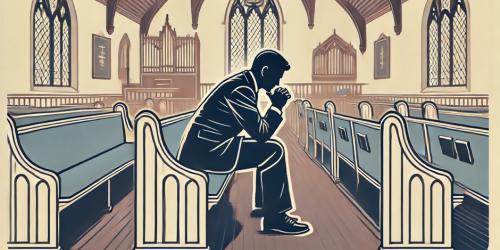Reformation Theology Blog
The Puritan Perspective on Courage in Adversity: A Witness to the Power of God and the Gospel
The English Puritans, known for their unwavering commitment to biblical truth and godly living, viewed courage in adversity as an essential virtue for the Christian life. Rooted deeply in their understanding of God’s sovereignty and providence, the Puritans believed that true courage emanates from a profound faith in God. They taught that adversity is not merely a trial to endure but an opportunity to demonstrate faith and glorify God. Adversity tests and refines a believer’s faith, as gold is refined in the fire (1 Peter 1:6-7).
We must not confide in the armour of God, but in the God of this armour
They use not the armour of God, as God hath appointed, who put a carnal confidence therein. We must not confide in the armour of God, but in the God of this armour, because all our weapons are only ‘mighty through God,’ II Cor. 10:4. The ark was the means of the Jews safety, but [being] carnally applauded and gloried in, hastened their overthrow: so duties and ordinances, gifts and graces in their place, are means for the soul's defence.
June 24—Morning—Revelation 8:3
"And another angel came and stood at the altar, having a golden censer; and there was given unto him much incense, that he should offer it with the prayers of all saints, upon the golden altar which was before the throne."—Revelation 8:3
The Knowledge of God
by Herman Bavinck
God as the highest good for mankind is the testimony of all Scripture.
The sacred narrative begins with the account of God creating man in His own image and likeness, that man might know his Creator, love Him with all his heart, and live in eternal communion with Him. It culminates in the vision of the New Jerusalem, where the redeemed will see God’s face, and His name will be upon their foreheads.
For the flesh lusts against the Spirit
"For the flesh lusts against the Spirit, and the Spirit against the flesh; and these are contrary to one another, so that you do not do the things that you wish." - Galatians 5:17
I will now present some practical inferences from this point: the hindrance and interruption caused by the flesh, even to godly individuals, preventing them from doing what they desire. The fifth inference is as follows:
Pietistic Vs. Biblical Sanctification
How many of us try to clean ourselves up before approaching the Lord's Table, as if there were some degree or level of purity that we could reach that would make us acceptable to God? The command to love God with all your heart and your neighbor as yourself should be sufficient to make you recognize your utter inability to do so. In all likelihood, the thinking that we have to make ourselves right and acceptable before God before he will accept us probably derives its origin from the influential but flawed theology of Pietism.
He shall gather the lambs with his arm
"He shall gather the lambs with his arm, and carry them in his bosom." — Isaiah 40:11.
My soul, mark in this sweet scripture how Jesus is described, in not only attending to all the various needs of his flock but also addressing their specific needs in a manner corresponding to his own character and their condition. In the fold of Jesus, like the sheepfold among men, some are sheep and some are lambs: some of advanced age, and some of younger standing.
The Special Grace of Humility
by Edward Leigh
Humility is that grace whereby a man makes little or no account of himself (Job 42:6; Ezek. 20:43). It is a grace of the Spirit of God, whereby a man, out of true knowledge of himself, his state, and condition, accounts himself vile and walks accordingly before God and man. Every good man is humble (Prov. 30:2; Luke 18:13). Poverty of spirit is the first step to heaven (Matt. 5:3). "High in worth and humble in heart," said Nazianzen of Athanasius. All the stars, the higher they are, the lesser they appear; so must all the saints.











